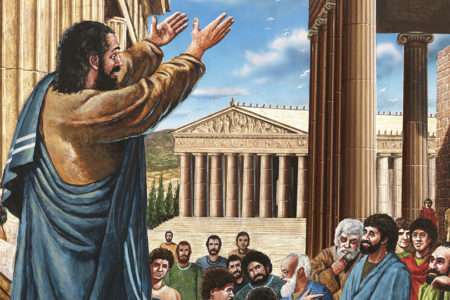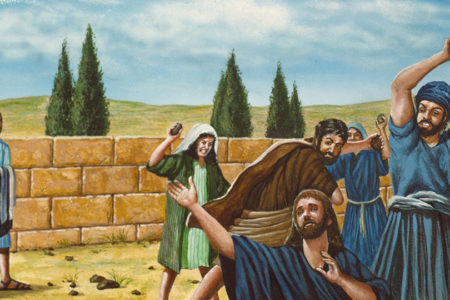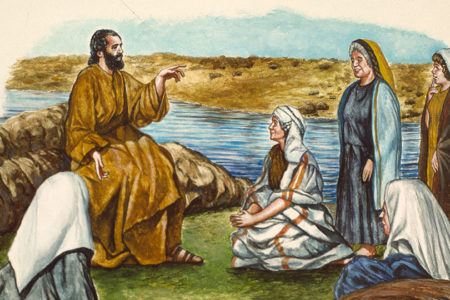Confronting Church Compromise Galatians 2:11–21
Confronting a brother face to face concerning compromise is never easy or pleasant, especially if that brother is a co-worker, of sterling reputation and character, and a highly respected church leader. Such encounters must be handled with extreme sensitivity, directed by spiritual wisdom and the Scriptures, and under the control of the Holy Spirit.
Paul closed this personal section of his letter to the Galatians by relating such an encounter with Peter. In a highly charged public incident, Paul boldly confronted Peter concerning his hypocrisy before the church at Antioch. In so doing, Paul confirmed two principles about his ministry: first, that he had equal authority with other apostles independently granted to him by the Lord; and second, that he would strongly oppose the preaching and practice of Mosaic legalism wherever and whenever he found it being taught in the church.
The confrontation apparently took place soon after the Jerusalem apostles had given Paul the “right hands of fellowship” (v. 9). Scholars are divided on whether the incident occurred after the famine visits (Acts 11:29–30) or the Jerusalem Council (Acts 15:3–4).
Peter’s Compromise
We are not told why Peter went to Antioch. Possibly it was to visit Paul and see firsthand how the work was progressing. While he was in Antioch, it wets Peter’s custom to fellowship and eat with Gentiles in the church (v. 12). The imperfect tenses of the verbs indicate that Peter had been doing this for some time on a regular basis; thus, he did not keep Kashrut (dietary laws). But when the Jewish leaders from the church in Jerusalem came to Antioch, Peter “withdrew and separated himself, fearing them who were of the circumcision” (v. 12). In other words, Peter gradually segregated himself from Gentiles, fellowshipping and eating only with Jewish believers. Why? Because he feared being criticized by his Jewish brethren. Peter’s actions caused the other Jewish believers in the church to join in the hypocrisy—even Barnabas (v. 13).
Paul called Peter’s compromise what it really was, “hypocrisy” (v. 13). The word hypocrisy was used in the Greek theater to describe actors who put large painted masks in front of their faces to denote the characters they were playing, thus hiding their real identities. Today the term is used to describe a deceitful or two-faced person. Peter was being two-faced, pretending that his actions were motivated by faithfulness to the Lord when, in reality, they were motivated by fear of criticism by the Jewish leaders who had come from the Jerusalem church.1
Paul’s Confrontation
When Paul witnessed Jewish believers not walking “uprightly according to the truth of the gospel” (v. 14), he “withstood [Peter] to the face” (v. 11). Paul condemned Peter’s action, “because he was to be blamed [stood condemned]” (v. 11).
The apostle put his rebuke in the form of a question: “If thou, being a Jew, livest after the manner of Gentiles, and not as do the Jews, why compellest thou the Gentiles to live as do the Jews?” (v. 14).
Peter had declared to the Jerusalem Council that Gentiles should not be put under the yoke of the Law (Acts 15:9–10), but now, by his actions, he had compromised his own convictions. Paul formed his question in such a way that if Peter had tried to answer, he would have admitted his guilt before the whole church. If Paul had not confronted Peter in such a manner, liberty in Christ would have been severely eroded, opening the door for Judaizers to corrupt the church.
Paul’s Conviction
The apostle seemed to pause, after confronting Peter with his question, to see if an answer would be forthcoming. But no answer was given, or at least none is recorded. Paul then continued his argument, dealing with three areas of controversy that Peter’s compromise had brought into question: (1) the Law’s relationship to salvation (vv. 15–16), (2) the believer’s relationship to the Law (vv. 17–19), and (3) the believer’s relationship to Christ (vv. 20–21). In these verses, Paul presented an introduction to the theme of his letter, which he developed more thoroughly in chapters 3 and 4.
Paul began his argument with the commonly held Jewish belief that “Jews by nature [birth]” are “not sinners of the Gentiles” (v. 15); that is, Jews were given the Law from birth and sought righteousness through it. This set them apart from the Gentiles, whom the Jews considered to be sinners. This concept does not imply a personal immorality committed by individual Gentiles but speaks of their legal standing before God.
Although Jews possessed the Law, which was of great advantage to them, they were not justified before God by keeping it, for “a man is not justified by the works of the law, but by [through] the faith [belief] of [in] Jesus Christ” (v. 16). Therefore, a person’s justification does not depend on his possession of the Law; salvation can be obtained only through faith in Christ. Notice the emphasis Paul placed on this point. He used the verb form of justification four times in verses 16 and 17 and the noun form one time (translated “righteousness”) in verse 21.
Paul used the word justification in a legal sense, indicating a judicial act of God whereby He justly declares and treats as righteous a guilty, condemned sinner who puts his faith in Jesus Christ for salvation. Being declared justified before God implies an act of personal commitment, not just a mental assent to facts concerning Christ’s sacrificial work on the cross. This is what Paul meant by the statement, “even we have believed in [into] Jesus Christ” (v. 16). The one who has been justified is declared righteous by God and is devoid of condemnation for past transgressions (Rom. 8:1, 31–34). Three times in this verse Paul reminded Jewish believers that they were not justified “by the works of the law” (v. 16) but by faith or belief in Jesus Christ (cp. Rom. 3:19–28).
Paul went on to show the absurdity of Peter’s action by raising a hypothetical question that Judaizers might make against his argument. He asked, “But if, while we seek to be justified by Christ, we ourselves also are found sinners, is therefore Christ the minister of sin?” (v. 17). Scholars differ over the exact meaning of this difficult verse. The best way to interpret the verse seems to be: (1) You say that salvation comes through faith in Christ alone, apart from any aspects of the Mosaic Law. (2) As believers, you are free from Law-keeping. (3) If the Law is done away with in Christ, you have no way to govern the way you should live as a Christian. (4) Paul’s lawless theology in Christ has brought you to a lifestyle that is no better than that of Gentile sinners. (5) Thus, a doctrine of justification by Christ alone is an incentive to live a life of sin. (6) Hence, Christ is responsible for your moral failure. (7) Therefore, Christ is the minister of sin.2
One can only imagine the embarrassment and awkward position in which Paul put Peter and Barnabas. The apostle had called them hypocrites and sinners and claimed that their practice of Law-keeping played right into the position of the Judaizers. But to his hypothetical question, Paul quickly proclaimed, “God forbid” (v. 17), or perish the thought! As painful as it was for Paul to raise such a horrible question, he had to do it in order to make a strong case against the hypocritical practice of Peter and the others.
In order to soften his rebuke of Peter, Paul changed the “we” (vv. 16–17) to “I” (v. 18), thus using himself in a hypothetical situation (although still referring to Peter). He said, “For if I build again the things which I destroyed, I make myself a transgressor” (v. 18). In other words, if Paul returned to the Mosaic Law after he had believed and preached that justification before God could be appropriated only through faith in Christ, he would be rebuilding that which he had destroyed. Thus, by leaving grace and returning to the Law, he would become a hypocrite (a “transgressor,” v. 18).3
Jewish believers in this generation must guard against keeping certain legalistic teachings found in Rabbinical Judaism, thus giving the impression that they are mixing Law with the grace of Christ. Neither should the Gentile believer feel that he has missed out on some special blessing by not keeping the laws of the Old Testament or Rabbinical Judaism, for the believer is complete in Christ (Col. 2:9–10).
Paul’s Comparison
In order to make his case stronger, Paul related his own experience with the Law. He said, “For I, through the law, am dead to the law, that I might live unto God” (v. 19). The apostle had found that keeping the Law could never give him life, for no one could fulfill its demands for righteousness. What the Law did, said Paul, was to reveal sin, provoke sin, provide no remedy for sin, and actually condemn him. Therefore, he left the Law as a way of becoming just before God and put his faith in Christ as the means by which he was declared righteous. This meant that Paul was “dead to the law” and free from its claims, relationship, or control over his life.4
This was no imaginary or self-imposed death but a real, imputed death with Christ. When Christ bore the believer’s sins, He died under the just demands of the Law (3:13), forever breaking the believer’s relationship to it (Rom. 7:4). Thus, Paul was alive unto God (v. 19), bringing him into a new and living relationship with Him.
In verse 20, Paul repeated this idea, but in greater detail. He said, “I am [have been] crucified with Christ: nevertheless I live.” The word crucified is in the perfect tense, emphasizing both the past act of Christ’s crucifixion and its continuing effects. Paul had been brought into a new legal union through faith in Christ. When he accepted the Lord, he became dead to the old life (man) and was resurrected to newness of life as the living Christ indwelt him (cf. 3:27; Rom. 6:3–11; 1 Cor. 12:13). Thus, Paul could say, “yet not I, but Christ liveth in me” (v. 20).
Paul went on to say, “and the life which I now live in the flesh I live by the faith of the Son of God, who loved me and gave himself for me” (v. 20). In other words, although he had a new life in the flesh, he was not motivated by the flesh but by faith in Christ. Thus, it is faith in Christ and not works (legal obedience) that releases divine power to live out the Christian life.5 Paul’s faith was anchored in the work of Christ, who, in unselfish and sacrificial love, “gave himself” (v. 20) through crucifixion for the sins of the world (cf. 1:4).
Paul concluded his argument against Peter and the others by showing that the hypocrisy of Law-keeping made “void [nullified or set aside] the grace of God; for if righteousness come by the law, then Christ is dead in vain” (v. 21); that is, His death was unnecessary, a useless tragedy, the greatest travesty in human history—a conclusion that was unthinkable and blasphemous in its ramifications. To many, Peter’s act might seem harmless—a little thing not worth making a fuss over, let alone considering it a compromise. But it was more than a little thing or mere compromise; it was hypocrisy, as Paul rightly called it.
Few men would boldly confront a leader of Peter’s stature and call him a hypocrite, as did Paul. Most leaders do not confront their peers but, rather, insulate or isolate themselves, remaining uninvolved. The attitude today is, Don’t rock the boat, live and let live! In this way, compromising practices creep into churches and mission organizations, leading them into unsound doctrinal positions and practices.
A number of lessons can be learned from the effects of Peter’s hypocrisy on Christians and the Church. First, he led some who followed him as a leader into hypocrisy (such as Barnabas). Second, his actions taught that there was a distinction between Jewish and Gentile believers, when none existed. Third, he sent a message to the Christian community that Jewish believers must keep the Law, which was untrue. Fourth, Peter’s conduct destroyed unity with the Church, bringing about division in the fellowship. Fifth, his compromise was a clear example that gifted ministers with a position of authority and responsibility can go astray. Sixth, faithfulness is more than believing right doctrine; it must be lived out in right practice. Seventh, Peter was practicing situation ethics, which is not biblical. Eighth, compromise provides opportunity for heretical teaching to invade the Church.
Remember, compromise must be confronted if the Church is to remain healthy and on a sound foundation.
ENDNOTE
- Warren W. Wiersbe, The Bible Exposition Commentary, Galatians (Wheaton, IL: Victor Books, Vol. 1, 1989), 694.
- Richard N. Longenecker, Word Biblical Commentary, Galatians (Dallas, TX: Word Books, 1990), 89.
- John MacArthur, The MacArthur New Testament Commentary, Galatians (Chicago, IL: Moody Press, 1987), 58-59.
- Kenneth S. Wuest, Wuest’s Word Studies, Galatians (Grand Rapids, MI: Wm. B. Eerdmans Publishing Co., 1944), 80.
- Donald K. Campbell, The Bible Knowledge Commentary, Galatians (Wheaton, IL: Victor Books, Vol. 2, 1983), 596.








